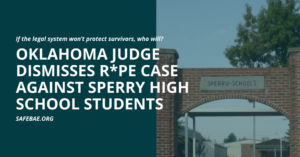Oklahoma Judge Dismisses R*pe Case Against Sperry High School Students
If the legal system won’t protect survivors, who will?
When the Law Fails Survivors in Oklahoma
Oklahoma has long been at the center of controversial legal decisions when it comes to sexual violence—but the latest ruling in the Sperry High School case has pushed that reality to an entirely new level.
A Tulsa County judge dismissed first-degree rape by instrumentation charges against three Sperry High School students, not because there wasn’t enough evidence, not because the case lacked credibility, but because the assault involved a foreign object rather than a body part.
Let’s say that again: Under Oklahoma law, penetration by an object isn’t classified the same way as penetration by genitals. The judge ruled that the assault didn’t meet the state’s legal definition of first-degree rape, which is reserved for acts involving a penis, vagina, or anus. As a result, the case was thrown out.
This is not just a legal technicality—it is a complete and total failure of the justice system to recognize the reality of sexual violence. Survivors know that rape is rape, regardless of what was used in the act of violence. To argue that an assault with an object is somehow less harmful, less violent, or less deserving of prosecution is beyond outdated—it’s dangerous.
Outdated Laws and a Justice System That Fails Survivors
Unfortunately, Oklahoma is not alone in maintaining archaic, deeply harmful laws that fail to recognize the full scope of sexual violence. Across the U.S., survivors are routinely denied justice because of outdated legal definitions, lack of trauma-informed training among law enforcement and judges, and a legal system that still operates from a place of ignorance rather than survivor advocacy.
Sexual violence laws in many states were written decades ago, when understanding of trauma, power dynamics, and coercion was even worse than it is today. These laws have barely evolved, leaving huge loopholes that allow perpetrators to escape accountability on a technicality.
But this case goes even further than just an outdated law—it’s a direct dismissal of the pain, trauma, and reality of survivors. The message this ruling sends is clear: Some forms of sexual violence “count” in the eyes of the law, and some don’t.
This is why survivors hesitate to report. This is why many cases never make it to trial. And this is why we need to demand real legislative reform that ensures ALL forms of sexual violence are prosecuted without loopholes, without dismissive language, and without allowing outdated legal definitions to erase a survivor’s reality.
Why These Conversations Matter
One of the most powerful activities we led was the Red Flags Exercise, which helped students think critically about the signs of healthy and unhealthy relationships. In this interactive activity, students wrote down relationship scenarios on sticky notes, crumpled them up, and threw them onto the stage. We picked out a few at random, read them aloud, and asked the group to vote: Was this a red flag, green flag, or yellow flag?
The discussion that followed was eye-opening. Many students recognized behaviors they had seen or experienced but hadn’t been taught to identify as harmful. This activity made it clear just how common and normalized certain red flags are in teen relationships—and why education is essential in helping young people navigate these situations safely.
Conversations like these are often missing from traditional sex education, leaving students without the tools to recognize warning signs, set boundaries, or advocate for themselves and their peers. By creating a space for open dialogue, SafeBAE empowers students to not only understand these issues but also become leaders in their own communities.
What We Know About the Case and the Survivor’s Fight for Justice
The details of the Sperry High School case are deeply disturbing—not just because of what happened, but because of how the system has repeatedly failed the survivor at every turn.
According to reports, the assault took place in October 2023 and involved three Sperry High School students. The victim reported that they were assaulted with a foreign object, an act that Oklahoma law defines as rape by instrumentation. This charge was originally filed as first-degree rape, a classification that should have reflected the severity of the crime and the long-term trauma inflicted on the survivor.
However, rather than ensuring that the case was heard fairly in a courtroom, the judge ruled that the charges didn’t fit the state’s legal definition of first-degree rape—a decision that completely disregarded the survivor’s experience and suffering.
The Tulsa County District Attorney’s Office has expressed outrage over the dismissal and has announced plans to appeal the ruling, but that doesn’t change what this case has already proven:
- The legal system still operates with outdated definitions of sexual violence that prioritize loopholes over justice.
- Survivors are still expected to fit a rigid, legally defined mold of “acceptable” victimhood before they are believed.
- The burden of justice continues to fall on the shoulders of survivors, forcing them to fight legal battles on top of the trauma they have already endured.
A Survivor Who Refuses to Be Silenced
Despite this horrifying legal setback, the survivor is continuing to fight. Their attorney has made it clear that they intend to pursue legal action against the school district, administrators, and the accused students, seeking accountability beyond what the criminal justice system has failed to provide.
This is a defining moment—not just for this case, but for how we talk about and respond to sexual violence in schools and the legal system.
If this survivor’s case was thrown out on a technicality, how many more cases just like it are being dismissed every single day? How many more survivors are being told—in no uncertain terms—that their trauma does not meet the state’s arbitrary standard of “real” rape?
This case is not just about one survivor or one school—it is about a system that continues to minimize, dismiss, and ignore the lived experiences of survivors everywhere.
How This Ruling Reinforces Rape Culture in Schools
This case isn’t just about one survivor or one ruling—it’s about the dangerous precedent it sets for schools, students, and survivors everywhere. By dismissing these charges, Judge April Seibert has reinforced the very culture of silence and impunity that allows sexual violence to persist in schools.
When a judge rules that a form of rape doesn’t legally “count” because of an outdated definition, it sends a clear and dangerous message. Survivors are once again reminded that their experiences might not be taken seriously. Even when they find the courage to come forward, even when there is evidence, even when people believe them, the system can still turn its back on them. It tells them that their pain is conditional, that their trauma must fit within narrow legal definitions to matter. And when a legal system continues to fail in protecting survivors, it only reinforces the same failure within schools, where so many sexual assaults occur.
For perpetrators, rulings like this serve as reassurance. It tells them that if the law is on their side, they can get away with it. They are given proof that technicalities will protect them before justice protects survivors. The reality is that when courts dismiss cases like this one, schools follow their lead. Administrators, teachers, and coaches—those who should be protecting students—see these decisions and internalize them. They learn to minimize, dismiss, or ignore reports of sexual violence, because after all, if the legal system itself won’t hold perpetrators accountable, why should they?
Sexual violence in schools is not an isolated issue. The Department of Education has found that nearly one in ten high school students experience some form of sexual assault before they graduate. But the vast majority never see justice. Their reports are often ignored, their experiences downplayed, and their schools more concerned with avoiding scandal than supporting survivors. The legal system is supposed to be their last line of defense, the place where accountability is finally enforced. But this ruling shows that even there, justice is far from guaranteed.
When perpetrators face no consequences, the damage ripples outward. They remain in the same classrooms and hallways as their victims. They are emboldened by the knowledge that they can harm again without fear. Their peers, watching from the sidelines, learn that sexual violence is tolerated. That speaking up won’t change anything. That silence is safer.
This ruling is not just a failure in a single courtroom; it is a reflection of the broader culture that allows sexual violence to thrive. Schools and courts should be places of safety, where survivors are heard, believed, and protected. Instead, they have become places where trauma is met with skepticism, where accountability is an afterthought, and where perpetrators walk free while survivors are left to carry the weight of their experiences alone.
This is how rape culture survives. And unless we demand better—unless we refuse to let these rulings go unnoticed—it will continue to thrive.
The Fight Isn’t Over—Take Action Now
This ruling is a devastating failure of justice, but survivors deserve better. Schools and courts must be held accountable, and real legal reform is long overdue. We cannot stay silent.
SafeBAE is here to support survivors and fight for change. Visit our Resources Page for survivor support, advocacy tools, and education on consent and sexual violence prevention. To help us continue this work, donate or host a SafeBAE speaker at your school. Email us directly with any questions! info@safebae.org
Justice starts with action. Join us.


